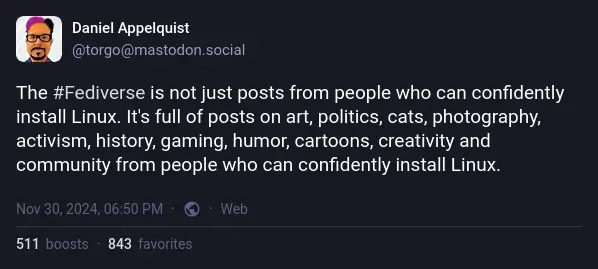this post was submitted on 01 Dec 2024
710 points (98.5% liked)
Fediverse memes
1761 readers
121 users here now
Memes about the Fediverse.
Rules
General
- Be respectful
- Post on topic
- No bigotry or hate speech
Specific
- We are not YPTB. If you have a problem with the way an instance or community is run, then take it up over at !yepowertrippinbastards@lemmy.dbzer0.com.
- Addendum: Yes we know that you think ml/hexbear/grad are tankies and or .world are a bunch of liberals but it gets old quickly. Try and come up with new material.
Elsewhere in the Fediverse
Other relevant communities:
- !fediverse@lemmy.world
- !yepowertrippinbastards@lemmy.dbzer0.com
- !lemmydrama@lemmy.world
- !fediverselore@lemmy.ca
- !bestofthefediverse@lemmy.ca
- !fedigrow@lemmy.zip
founded 10 months ago
MODERATORS
you are viewing a single comment's thread
view the rest of the comments
view the rest of the comments

Correct. Installing Linux isn't the issue. Getting any hardware you have to actually function properly and fully, along with learning new software for your needs that can at times have less functionality and user friendliness, is the difficulty with Linux.
The lack of consumer software is the real big issue yet to be solved. We're getting gaming sorted, finally, but that's required the biggest game distributor in the world (valve) to basically take the project over completely to get there. We just haven't gotten to the point that enterprise environments will start switching desktops over to linux, because the network management and production tools just aren't there yet. Hopefully we will be there soon, the pace of adoption is really picking up especially with win10 EOL, but until then there's some real hard work to be done before the "linux best" memes stop being wishful thinking.
Well yeah Linux is getting gaming solved through a compatibility layer. I don't think that is the big push so many people think it is. It doesn't make developers want to develop for Linux. It makes them feel like someone else will make their game work on Linux without their involvement. If compatibility layers are the solution to Linux adoption, you might as well have used Windows to begin with because you'll never reach 100% compatibility without running Microsoft's code.
What Linux really needs is proper native development but that requires public adoption and I suspect that will never happen as long as people are required to install an OS ever. If Linux isn't already on the bare metal when the consumer buys the box, 99% of the time, Linux will never run on that box.
People who install OS's are an outlier.
On this issue, I don't think it really matters if it's native code or running on a compatability layer, for the end user the result is the same. Proton means you can game on linux now, which was the damn rallying cry for people who didn't want to switch to linux. You can see the adoption rates jump up after proton was introduced, and hopefully we've hit critical mass and it continues to rise